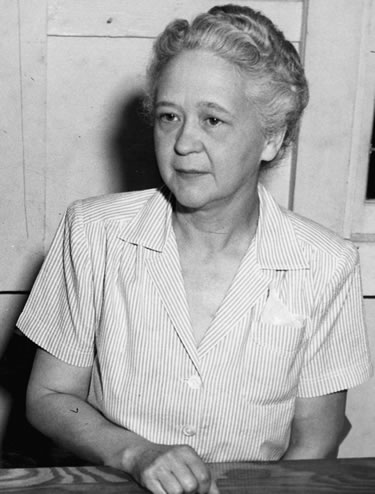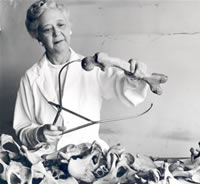 |
| “Trotter taught more than 4,000 students with flair and distinction.” |
Mildred Trotter was born February 3, 1899, in Monaca, Pennsylvania. She graduated from Mount Holyoke College with a Bachelor’s degree in 1920. She earned a doctorate in anatomy at Washington University in 1924. Later, she was granted honorary doctor of science degrees from Western College and Mount Holyoke College.
Trotter’s research interests were physical anthropology and human anatomy. Her discoveries in hair and skeletal mass contributed much of what is known today about the influence of age, sex and race on variation in bone growth. Her formulas for estimating stature are still used by the FBI.
Trotter first joined the Department of Anatomy in 1924 as an instructor. She became an assistant professor in 1926 and an associate professor in 1930. In 1946, she became a full professor of gross anatomy. In 1967, she retired to become professor emerita and lecturer.
Trotter’s expertise led to many fellowships and external appointments. She was a member of the American Association for the Advancement of Science, the Association of Physical Anthropology, the Anthropological Association and the Anatomical Societies of Great Britain and Ireland.
 |
Mildred Trotter, or “Trot,” as she was known, came to Washington University School of Medicine in 1920 as a young graduate student. For more than six decades she contributed to the university as a scholar and teacher and as an exemplary role model for what a determined and gifted woman could achieve.
| “…one of the most eminent 20th century contributors to the field of physical anthropology, especially to knowledge about human bone and hair.” |
Over the years, Trot taught more than 4,000 students with such flair and distinction that the WUSM Alumni Association endowed a lectureship in her name in 1975. To acknowledge her deep concern for the role of women in science and medicine, the lectureship is used to bring a distinguished woman scientist to the university every year.
| “Her research efforts led to findings which have proven useful not only to clinical medicine, but also to fields such as forensic science, physical anthropology and archaeology.” |
As a pioneering woman in medical research, Trot intimately knew the difficulties and discouragement facing the female medical students she taught. Periodically, she would load all of the first-year women into her car for some R & R at Pere Marquette State Park. Trot also believed in speaking out about unequal treatment. Despite colleagues’ advice and after 16 years as an associate professor, Trot insisted that the new chair of anatomy either promote her or tell her “in what way she was deficient.” Shortly thereafter, she became the first female full professor at WUSM. The next would be Gerty Cori, the year she won the Nobel Prize.
